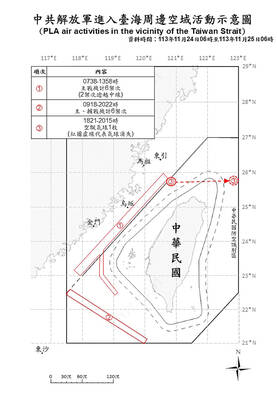Government officials and academics yesterday urged the power industry, environmental groups and government agencies to consolidate the fight against greenhouse gas emissions, suggesting policy be modeled on Germany and South Korea.
“We have to rapidly lay the framework for our nation’s sustainable development by re-focusing our efforts to aid the environment,” Environmental Protection Administration Minister (EPA) Stephen Shen (沈世宏) told industry professionals, professors and government officials from various energy, environmental and foreign affairs departments at a conference.
It was held prior to the departure of a delegation for the UN Framework Convention on Climate Change (UNFCCC) in Copenhagen.
The meeting will likely result in concrete initiatives on global emissions trading and further pledges of reductions, analysts said.
Shen said that Taiwan was at a “pivotal transition phase.”
President Ma Ying-jeou’s (馬英九) pledge to reduce carbon emissions to 50 percent of 2025’s levels by 2050 was criticized by analysts for lacking concrete initiatives.
However, Yang Jih-Chang (楊日昌), the former Executive Vice President of the Industrial Technology Research Institute (ITRI), said government policy could modeled on that of regional competitors such as South Korea and China, who have put into place a “top-down approach” to environmental policy.
“We need reduction policies that are broader in scope and to use them as an engine for economic growth ... in the [global green economy] that is estimated to be worth US$10.5 trillion in the next 20 years,” Yang said, adding he believed the South Korean government’s promise of large investments in the industry was a right one.
An analysis by the bank HSBC, showed that more than 80 percent of South Korea’s US$38 billion stimulus package has been earmarked for green projects and investments.
Industry representatives, however, called for a more careful approach, to avoid the possibility of an adverse reaction in a struggling economy caused by hastily put together policies.
“Government agencies should communicate with business leaders before deciding on environmental policies which might eventually become law,” said Hsu Fang-ming (許芳銘), a representative from the Taiwan-based Chinese National Federation of Industries.
Researchers said the government needed to hasten its implementation of green initiatives and called the legislature’s delay in passing the Greenhouse Gas Reduction Act (溫室氣體減量法) “a failure to acknowledge the gravity of the problem.”
Professor Fan Chien-te (范建德) from National Tsing Hua University called on the government to create clear and ambitious targets for the act.
“Germany has had clearly defined emission reduction targets ... renewable energy now accounts for 18 percent of its total, it is also on course to deliver on 40 percent reductions of its 1990 level within the next decade ... meanwhile, what have we done?” Fan asked.

Taiwan’s passport ranked 34th in the world, with access to 141 visa-free destinations, according to the latest update to the Henley Passport Index released today. The index put together by Henley & Partners ranks 199 passports globally based on the number of destinations holders can access without a visa out of 227, and is updated monthly. The 141 visa-free destinations for Taiwanese passport holders are a slight decrease from last year, when holders had access to 145 destinations. Botswana and Columbia are among the countries that have recently ended visa-free status for Taiwanese after “bowing to pressure from the Chinese government,” the Ministry

Theaters and institutions in Taiwan have received 28 threatening e-mails, including bomb threats, since a documentary critical of China began being screened across the nation last month, the National Security Bureau said yesterday. The actions are part of China’s attempts to undermine Taiwan’s sovereignty, it said. State Organs (國有器官) documents allegations that Chinese government officials engage in organ harvesting and other illegal activities. From last month to Friday last week, 28 incidents have been reported of theaters or institutions receiving threats, including bomb and shooting threats, if they did not stop showing the documentary, the bureau said. Although the threats were not carried out,

HEALTHCARE: Following a 2022 Constitutional Court ruling, Taiwanese traveling overseas for six months would no longer be able to suspend their insurance Measures allowing people to suspend National Health Insurance (NHI) services if they plan to leave the country for six months would be abolished starting Dec. 23, NHIA Director-General Shih Chung-liang (石崇良) said yesterday. The decision followed the Constitutional Court’s ruling in 2022 that the regulation was unconstitutional and that it would invalidate the regulation automatically unless the NHIA amended it to conform with the Constitution. The agency would amend the regulations to remove the articles and sections that allow the suspension of NHI services, and also introduce provisional clauses for those who suspended their NHI services before Dec. 23, Shih said. According to

‘GRAY ZONE’ TACTICS: China continues to build up its military capacity while regularly deploying jets and warships around Taiwan, with the latest balloon spotted on Sunday The US is drawing up contingency plans for military deployments in Japan and the Philippines in case of a Taiwan emergency, Japan’s Kyodo news agency reported. They would be incorporated in a first joint operation plan to be formulated in December, Kyodo reported late on Sunday, citing sources familiar with Japan-US relations. A US Marine Corps regiment that possesses High Mobility Artillery Rocket Systems — a light multiple rocket launcher — would be deployed along the Nansei Island chain stretching from Kyushu to Yonaguni near Taiwan, Kyodo said. According to US military guidelines for dispatching marines in small formations to several locations,